One of our Trust Alliance members was assisting a leadership team in assessing why a certain division was underperforming. We worked with them to run our simple one minute AIM Trust Audit for both the leadership team and the division employees. Take a look at the results. The first chart is leadership (38 respondents) and the second is the division employees. (108 respondents).
A relatively wide gap existed between the leadership team’s perception of the behaviors undermining trust compared to the employee’s perception. These results are quite common in our assessments.
How do you think the leadership team responded when provided with this data?
What would you advise them to do next?

Barbara Brooks Kimmel is an author, speaker, product developer and global subject matter expert on trust and trustworthiness. Founder of Trust Across America-Trust Around the World she is author of the award-winning Trust Inc., Strategies for Building Your Company’s Most Valuable Asset, Trust Inc., 52 Weeks of Activities and Inspirations for Building Workplace Trust and Trust Inc., a Guide for Boards & C-Suites. She majored in International Affairs (Lafayette College), and has an MBA (Baruch- City University of NY). Her expertise on trust has been cited in Harvard Business Review, Investor’s Business Daily, Thomson Reuters, BBC Radio, The Conference Board, Global Finance Magazine, Bank Director and Forbes, among others.
For more information visit our website at www.trustacrossamerica.com
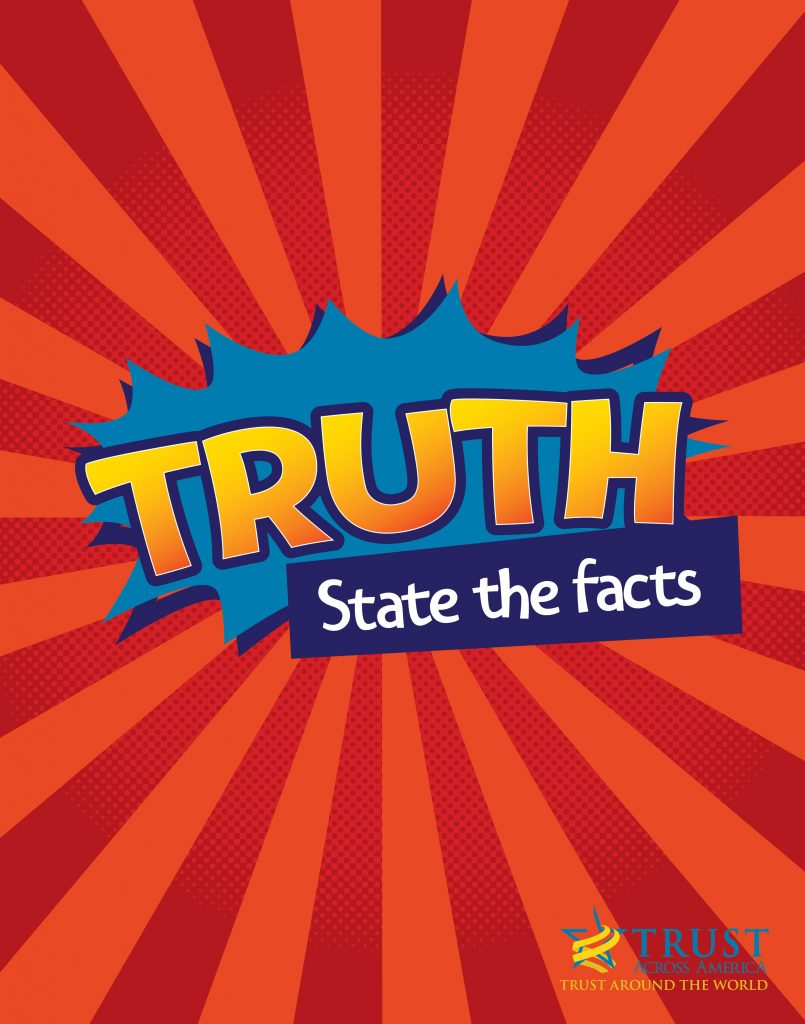
Do you, and should you trust the news, especially now? Do you prefer watching Fox over CNN and does it really matter?
As we continue to suffer from Covid fatigue, we now find ourselves further divided by politics, with new details emerging about global news funding and biased reporting. Is there any reason to believe what the media is telling us? In other words, can the media be trusted?
Applying Trust Across America-Trust Around the World’s (TAA-TAW) universal trust principles called TAP reveals some unsettling observations and results.
Take a minute to Answer “Yes” or “No” to each of these questions:
Truth– Does truthful media reporting come before a hidden agenda or monetary gain?
Accountability– Is the media holding itself accountable and taking responsibility regardless of affiliation?
Purpose– Is the media engaging others in building shared purpose to avoid short-term wins?
Integrity– Is the media committed to accuracy in pursuit of the facts?
Notice- Is the media seeking out, listening to and reporting on diverse perspectives?
Talent– Is the media rewarding moral character?
Openness– Is the media open and ready to learn?
Transparency– Is the media rejecting hidden agendas?
Respect– Is the media respectful of each other?
Understanding– Does the media celebrate its successes and also report on its failures?
Safety- Does the media call out all unethical behavior and make it safe to be honest?
Tracking– Does the media scorecard their performance against their values?
What was your “Yes” and “No” answer count?
Can you think of any news media that would score a passing grade of 60% or more?
Can the media be trusted to report the news without bias?
And before you finish reading, substitute the word “media” for “government” or “business” and see if the results change.
Barbara Brooks Kimmel is an author, speaker, product developer and global subject matter expert on trust and trustworthiness. Founder of Trust Across America-Trust Around the World she is author of the award-winning Trust Inc., Strategies for Building Your Company’s Most Valuable Asset, Trust Inc., 52 Weeks of Activities and Inspirations for Building Workplace Trust and Trust Inc., a Guide for Boards & C-Suites. She majored in International Affairs (Lafayette College), and has an MBA (Baruch- City University of NY). Her expertise on trust has been cited in Harvard Business Review, Investor’s Business Daily, Thomson Reuters, BBC Radio, The Conference Board, Global Finance Magazine, Bank Director and Forbes, among others.
Fifteen plus years have passed since I began studying trust and trustworthiness and building tools to help leaders and teams. My focus remains on companies of all sizes and across industries. Without exception 2024 certainly had its share of organizational trust challenges from data breaches (Ticketmaster, Meta), to product safety violations (Boeing, Kellogg), and toxic workplaces (Nike, Uber) to name just a few.
OUR DATA
- Close to 200,000 global participants have accessed our Trust Alliance Principles, the result of the efforts of some of the worlds leading trust scholars and practitioners. They are available at no cost and in multiple languages on our website at www.trustacrossamerica.com.
- The behavioral trends in our “TAP INTO TRUST” ongoing survey of interpersonal workplace trust have not wavered since we began tracking them in 2019 with over 700 respondents reporting the following:
42% report weak ACCOUNTABILITY
38% report weak TRANSPARENCY
46% report weak TRACKING of trust
In fact, every behavior (12 in total) in our survey shows at least 20% of respondents reporting weaknesses within their organization.
- Our FACTS Framework tracking the trustworthiness of public companies highlights a strong business case for organizations to focus on trust, After 13+ years our Trust 200 Index, maintained by IndexOne continues to outperform the S&P 500.

What will 2025 bring? We gathered some opinions and ideas from some of our trust colleagues in the recently published winter 2025 issue of Trust! Magazine. The link is available on the home page of our website.
Barbara Brooks Kimmel is an award winning author, speaker, product developer and global subject matter expert on trust and trustworthiness. Founder of Trust Across America-Trust Around the World she is author of the award-winning Trust Inc., Strategies for Building Your Company’s Most Valuable Asset, Trust Inc., 52 Weeks of Activities and Inspirations for Building Workplace Trust and Trust Inc., a Guide for Boards & C-Suites. She majored in International Affairs (Lafayette College), and has an MBA (Baruch- City University of NY). Her expertise on trust has been cited in Harvard Business Review, Investor’s Business Daily, Thomson Reuters, BBC Radio, The Conference Board, Global Finance Magazine, Bank Director and Forbes, among others.
The returns of the Trust 200 Index over 13+ years according to IndexOne
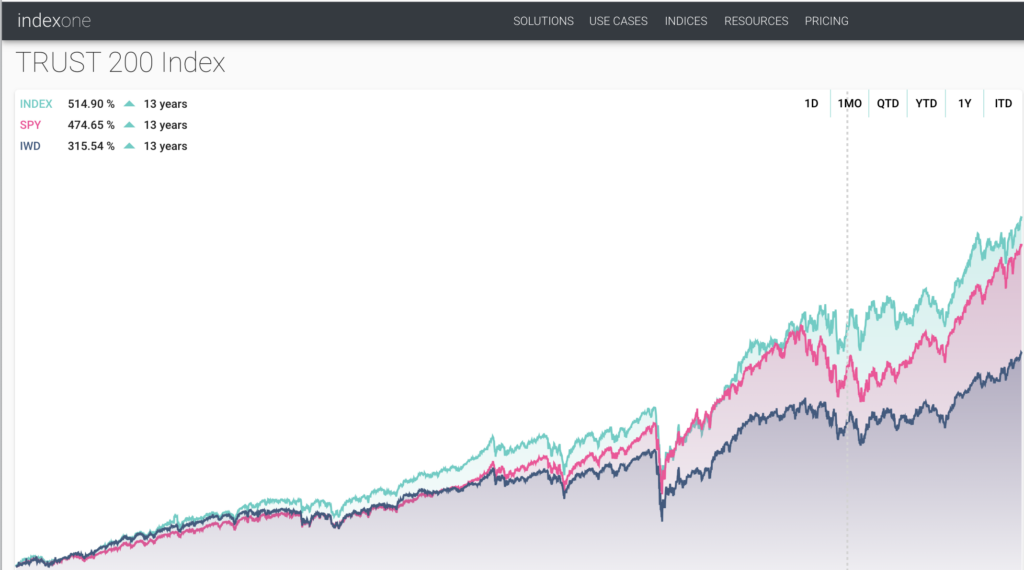
More than 15 years ago The Economist published a briefing paper sponsored by Cisco, called “The Role of Trust in Business Collaboration,” concluding that tens of millions of dollars had been spent evaluating corporate governance but a *definition of corporate trust continued to elude us. The 2008 financial crisis essentially destroyed investor confidence in the stock market and the ethical decision making practices of business leaders and their public companies. And so it should come as no surprise that trust in the financial markets has stagnated and even deteriorated since that time. After all, what actions, if any, have organizations taken to build investor confidence and trust? Plenty of money is spent on PR “talk” followed by little constructive action.
What if instead of using the elusive word “trust” as the barometer, companies could instead be evaluated based on their trustworthiness? In other words, the ethical business principles and leadership practices that support trust building within the organization and can then be applied to all stakeholders. This was the question we began to address over fifteen years ago. With the assistance of academic, financial, corporate and consulting professionals, Trust Across America began to construct what became the FACTS Framework.
*Trust Across America describes trust at the individual/interpersonal level as the “outcome of principled behavior” and organizational trustworthiness as the “collective outcome of principled behavior.”
Our ten+ year study published in November 2021 continues to be, by order of magnitude, the most comprehensive and data driven analysis available regarding the trustworthiness of public companies. It speaks to both the public and the financial industry’s understanding of trust, supports trust based investment decision making and enables targeted and simplified trust portfolio construction. We analyze companies quarterly and rank order by company, sector and market capitalization.
As our chart and study link above highlight, trustworthy public companies are rewarded over the long-term. They not only avoid expensive crises but also have the benefit of broader internal and external stakeholder support.
Low trust keeps investors out of the stock market and on the sidelines
It has not been valuation, liquidity, or profits that keeps many investors on the sidelines. It is a lack of trust in both the financial industry and in the ethical actions and decision making practices of public company leadership. Even after a time of dramatic returns over the past several years, vast amounts of money remain parked in low yielding money market accounts and other underperforming investments. By delivering a time tested and “beyond reproach” strategy to investors combining the key drivers of corporate trustworthiness, Trust Based Investing can serve as a viable solution that both the industry and the public has been seeking.
In conclusion
Trust Based Investing provides the following:
- Companies have proven through a rigorous analysis that they are trustworthy and represent lower investment risk.
- Investors can be assured that ethical business and investment decisions are being made.
- Trustworthy companies have stable and strong investment returns.
- A virtuous cycle is created. As investment money flows into the hands of these companies, other companies will want to follow suit and become more trustworthy.
Barbara Brooks Kimmel is an author, speaker, product developer and global subject matter expert on trust and trustworthiness. Founder of Trust Across America-Trust Around the World she is author of the award-winning Trust Inc., Strategies for Building Your Company’s Most Valuable Asset, Trust Inc., 52 Weeks of Activities and Inspirations for Building Workplace Trust and Trust Inc., a Guide for Boards & C-Suites. She majored in International Affairs (Lafayette College), and has an MBA (Baruch- City University of NY). Her expertise on trust has been cited in Harvard Business Review, Investor’s Business Daily, Thomson Reuters, BBC Radio, The Conference Board, Global Finance Magazine, Bank Director and Forbes, among others.
If you are a member of a Board of Directors or work with boards who want to build and model trust start with these guiding principles.
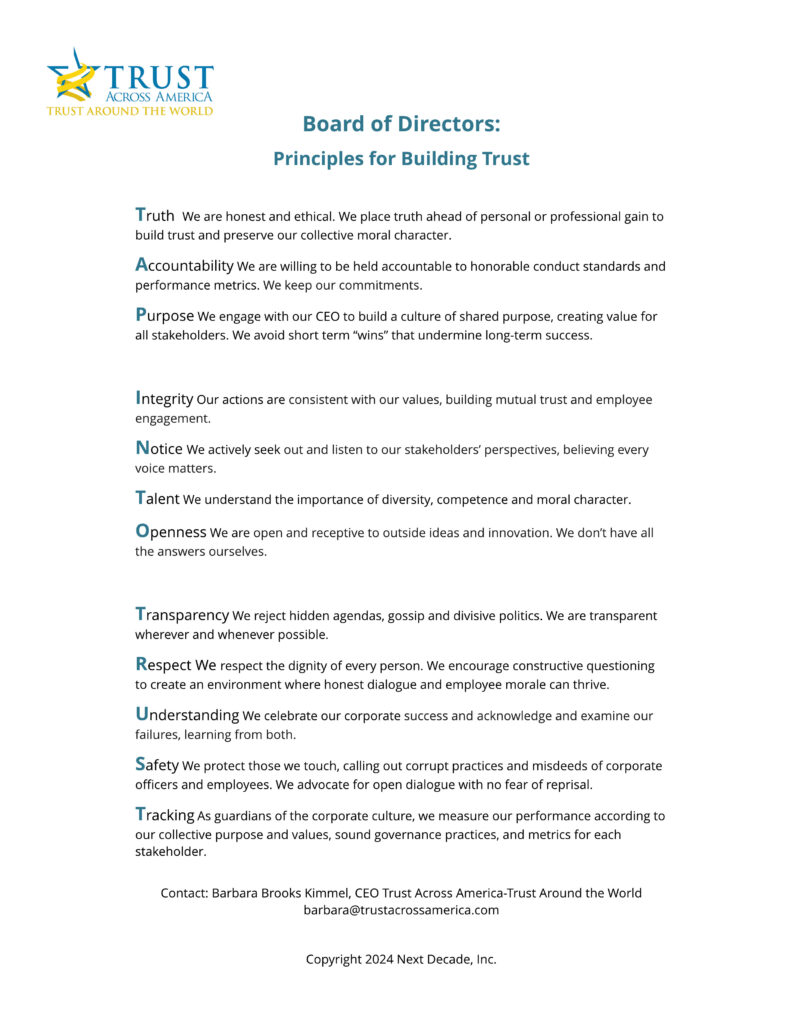
For more information and resources on building trust at the Board of Director level contact me directly at barbara@trustacrossamerica.com
Barbara Brooks Kimmel is an author, speaker, product developer and global subject matter expert on trust and trustworthiness. Founder of Trust Across America-Trust Around the World she is author of the award-winning Trust Inc., Strategies for Building Your Company’s Most Valuable Asset, Trust Inc., 52 Weeks of Activities and Inspirations for Building Workplace Trust and Trust Inc., a Guide for Boards & C-Suites. She majored in International Affairs (Lafayette College), and has an MBA (Baruch- City University of NY). Her expertise on trust has been cited in Harvard Business Review, Investor’s Business Daily, Thomson Reuters, BBC Radio, The Conference Board, Global Finance Magazine, Bank Director and Forbes, among others.
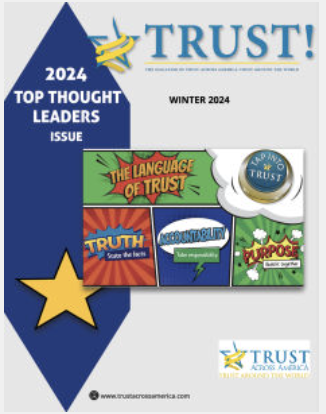
Trust Across America-Trust Around the World (TAA-TAW) whose mission is to help enhance trustworthy behavior in organizations, announces its 2024 Top Thought Leaders in Trust. The awards program, now in its 13th year, celebrates professionals who are transforming the way organizations do business.
While a growing number of global “top” lists and awards are published, no others specifically address trust. Celebrating its 16th anniversary this year, TAA-TAW has been working with a growing team of global cross-functional professionals to research the “practice” of trust and build tools to support leaders, teams and organizations who choose to build, elevate or repair trust.
According to Barbara Kimmel, CEO, ”The release of our 2024 honors brings the focus to global champions of trust. Beginning this year we will be recognizing ten professionals who inspire organizations to look more closely at their higher purpose…to create greater value for, and trust from all of their stakeholders, and understand trust is a “hard currency” with real returns. All of our honorees have made a significant contribution to the field of trust over the past 12 months. Their expertise ranges from journalism to financial services.”
The honorees can be accessed via the Winter 2024 issue of TRUST! Magazine, available at no cost at this link, including complete details on our methodology, award winners, and additional trust resources.
Nominate now for our 2025 Top Thought Leaders at this link.
Trust Across America-Trust Around the World™ is a program of Next Decade, Inc., an award-winning communications firm that has been unraveling and simplifying complex subjects for over 20 years. TAA-TAW helps organizations build trust through an abundance of resources and ever-expanding tools. It also provides several frameworks for organizations to improve trustworthy practices, and showcases individuals and organizations exhibiting high levels of trust and trustworthiness.
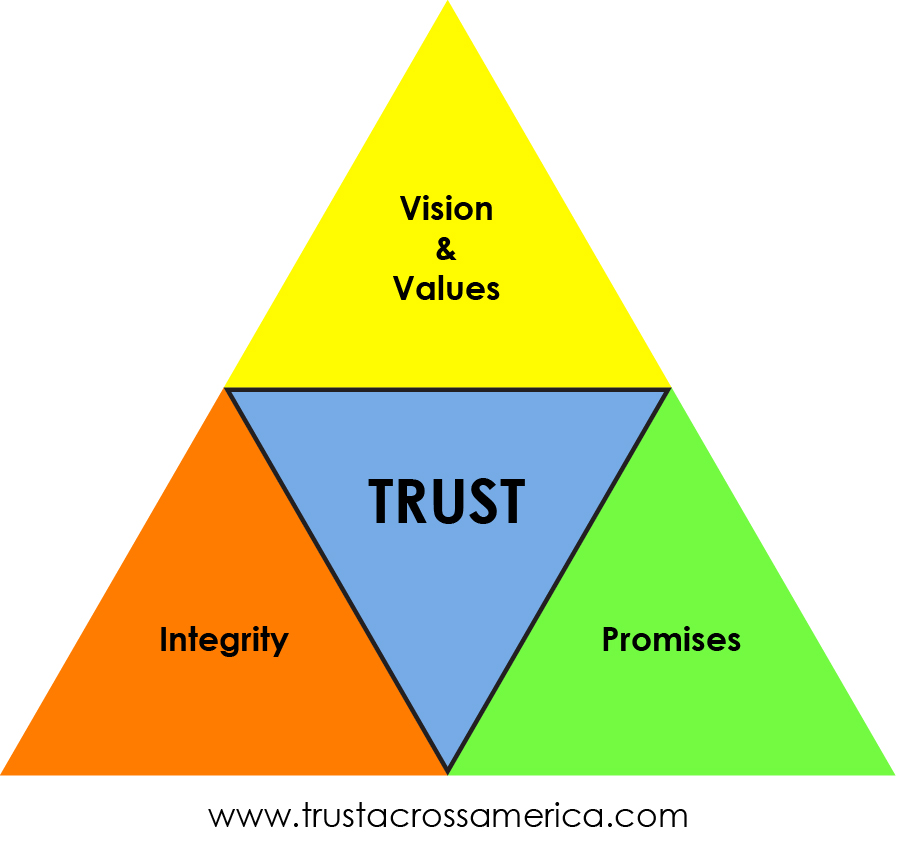
Trust is the outcome of principled behavior. It’s always interpersonal and it’s always about people. If you want to intentionally build trust into your leadership strategy in 2024, stop talking and start acting. These are some tried and true strategies to get you started in the new year.
The mistruths about trust seem to compound by the day. What are some of the most common mistruths?
(and some stupid ideas about trust in business:)
The business case for trust is irrefutable. This document contains some of the best research/survey results.
As the saying goes, you can’t manage what’s not being measured. Start measuring and tracking trust:
Trust cannot be delegated. Understand who “owns” trust:
Trust must be modeled, practiced and reinforced daily. Leaders must act first: Trust takes time and is built in incremental steps. It always begins with you. If you do not model trust do not expect it in return.
Start hiring for trust. If trust is not built into an organization’s hiring practices, now is the time to start. Here You will find thirteen questions worth asking.
Have you stopped to consider that your employees may not trust you? Find out why your employees don’t trust you: The fix may be easier than you think, but only if you are open to learning.
And finally, if you are spending money on building trust with your customers while taking employee trust for granted, you are violating the most basic tenets of trust. As a leader, you may see short term positive results, but over the long term employee engagement will continue to stagnate. Remember, trust is always built from the inside out.
Barbara Brooks Kimmel is an author, speaker, product developer and global subject matter expert on trust and trustworthiness. Founder of Trust Across America-Trust Around the World she is author of the award-winning Trust Inc., Strategies for Building Your Company’s Most Valuable Asset, Trust Inc., 52 Weeks of Activities and Inspirations for Building Workplace Trust and Trust Inc., a Guide for Boards & C-Suites. She majored in International Affairs (Lafayette College), and has an MBA (Baruch- City University of NY). Her expertise on trust has been cited in Harvard Business Review, Investor’s Business Daily, Thomson Reuters, BBC Radio, The Conference Board, Global Finance Magazine, Bank Director and Forbes, among others.
For more information visit our website at www.trustacrossamerica.com
As the year draws to a close, I am pleased to provide the following visual summary of the progress we made at Trust Across America-Trust Around the World in 2023. For more information please visit our website at www.trustacrossamerica.com or reach out directly to me at barbara@trustacrossamerica.com
#1 Trust Across America’s Trust 200 Index Continues to Outperform the S&P 500 over time (12 years)
trustacrossamerica.com/documents/index/Return-Methodology.pdf
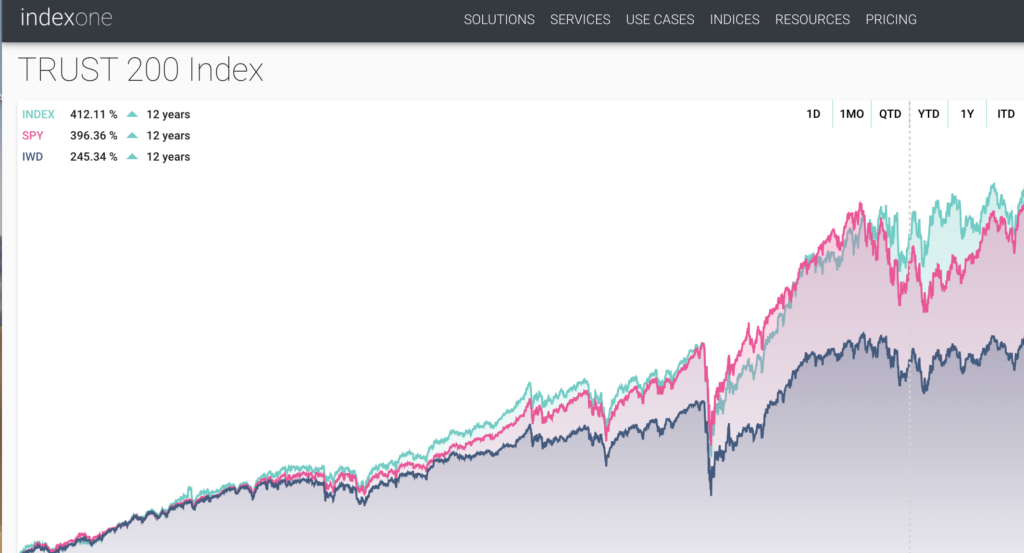
#2 Over 180,000 Have Tapped Into Trust
trustacrossamerica.com/tap-into-trust.shtml
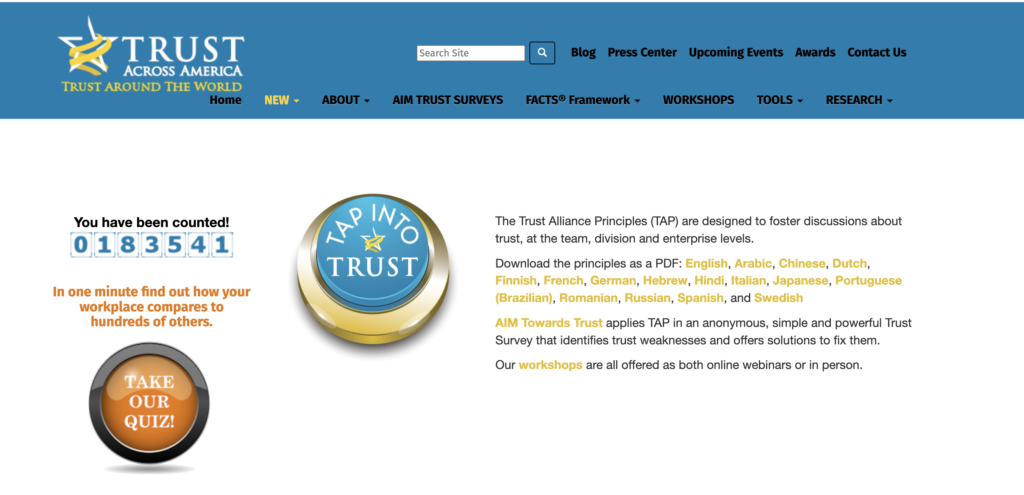
#3 Over 700 Have Taken Our 1 Question “Quiz” Identifying the Behaviors Weakening Workplace Trust
www.surveymonkey.com/r/Trust-One-Principle
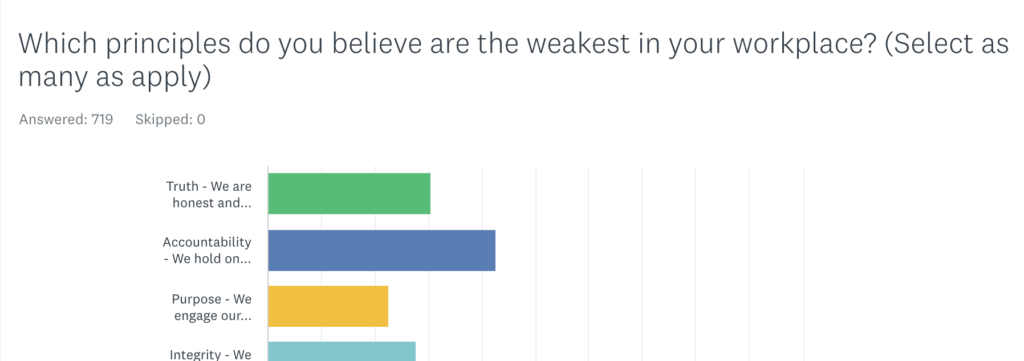
Feel free to reach out with questions or comments. Best wishes for more trust in 2024.
Barbara Brooks Kimmel, Founder
One of our Trust Alliance members was recently hired by a leadership team to help identify why a certain division was underperforming. They contacted us to run our simple one minute AIM Trust Audit for both the leadership team and the division employees. Take a look at the results. The first chart is leadership (38 respondents) and the second is the division employees. (108 respondents).
A relatively wide gap revealed itself between the leadership team’s perception of the behaviors undermining trust compared to the employee’s perception. I wish I could say that these results are an anomaly, but they are not. How do you think the leadership team responded when provided with this data? What would you advise them to do next?

Barbara Brooks Kimmel is an author, speaker, product developer and global subject matter expert on trust and trustworthiness. Founder of Trust Across America-Trust Around the World she is author of the award-winning Trust Inc., Strategies for Building Your Company’s Most Valuable Asset, Trust Inc., 52 Weeks of Activities and Inspirations for Building Workplace Trust and Trust Inc., a Guide for Boards & C-Suites. She majored in International Affairs (Lafayette College), and has an MBA (Baruch- City University of NY). Her expertise on trust has been cited in Harvard Business Review, Investor’s Business Daily, Thomson Reuters, BBC Radio, The Conference Board, Global Finance Magazine, Bank Director and Forbes, among others.
For more information visit our website at www.trustacrossamerica.com
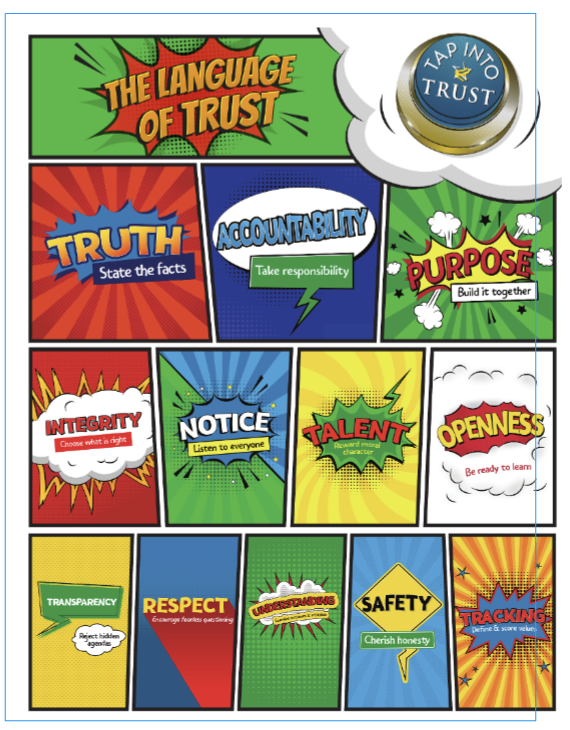
1. Trust is not an input. It’s an outcome.
2. Trust cannot be broken in an instant.
3. The words trust, trustworthy and trusting do not have the same meaning and cannot be used interchangeably.
4. There is no trust “box” that can be checked.
5. Perception of trust does not equal trust.
6. There is no oxytocin “trust molecule.”
7. Trust cannot be regulated or “technologized.”
8. The most “popular” social media names in trust are not the most knowledgeable. They just have bigger budgets.
9. Using trust words du jour does not equal action. (Brand trust is not trust.)
10. Reducing quantifiable risk does not increase trust.
Barbara Brooks Kimmel is an author, speaker, product developer and global subject matter expert on trust and trustworthiness. Founder of Trust Across America-Trust Around the World she is author of the award-winning Trust Inc., Strategies for Building Your Company’s Most Valuable Asset, Trust Inc., 52 Weeks of Activities and Inspirations for Building Workplace Trust and Trust Inc., a Guide for Boards & C-Suites. She majored in International Affairs (Lafayette College), and has an MBA (Baruch- City University of NY). Her expertise on trust has been cited in Harvard Business Review, Investor’s Business Daily, Thomson Reuters, BBC Radio, The Conference Board, Global Finance Magazine, Bank Director and Forbes, among others.
For more information visit our website at www.trustacrossamerica.com

Recent Comments